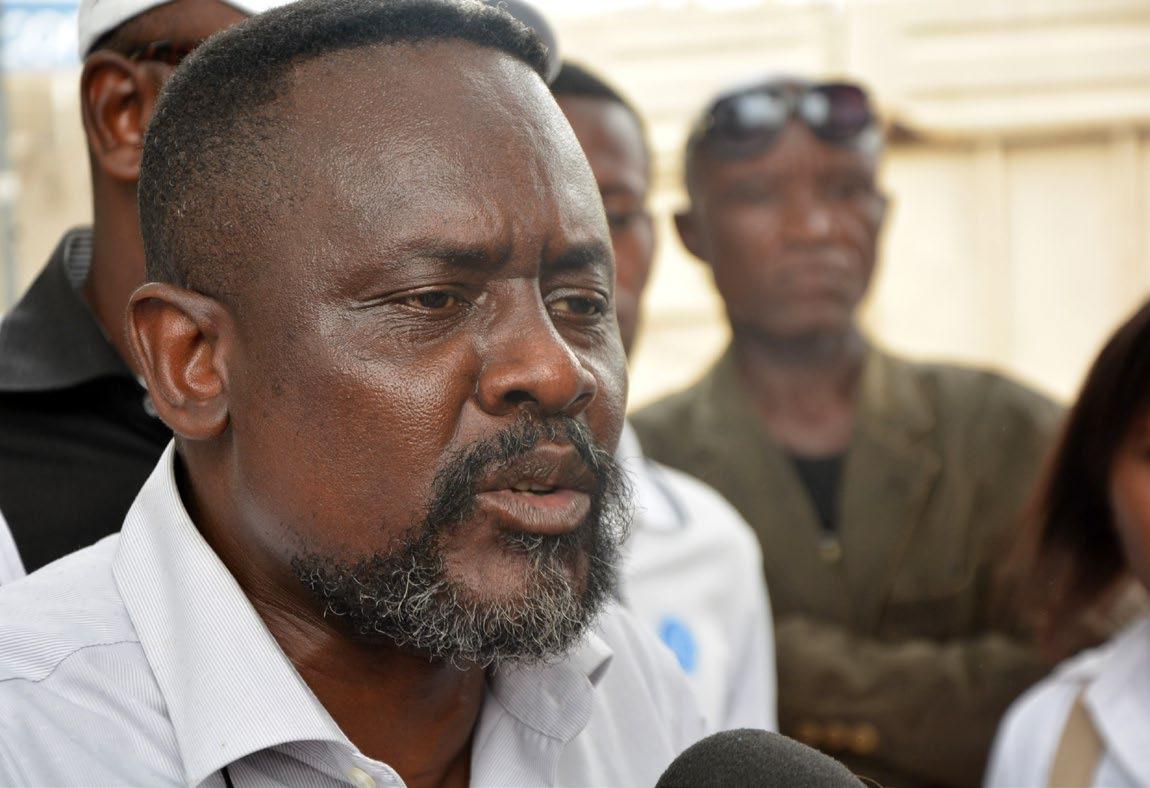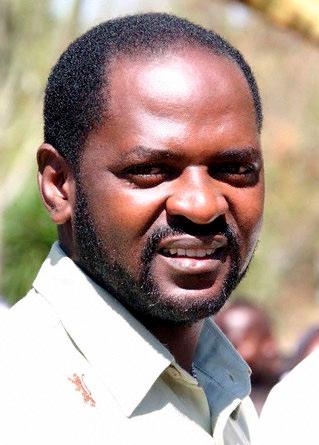
5 minute read
Democratic Republic of the Congo
from Inter-Parliamentary Union's Decision of the Committee on the Human Rights of Parliamentarians - 170t
Decision adopted by the Committee on the Human Rights of Parliamentarians at its 170th session (Geneva, 21 January to 2 February 2023)
COD86 – Franck Diongo
Advertisement
Alleged human rights violations:
Torture, ill-treatment and other acts of violence
Impunity
Lack of due process at the investigation stage and lack of fair trial proceedings
Right of appeal
A. Summary of the case
Mr. Diongo, an opposition member of parliament, was arrested together with several activists from his political party at his home on 19 December 2016 by presidential guard soldiers. He was reportedly tortured and then summarily tried under an accelerated procedure, despite a worrying medical condition as a result of illtreatment in detention. On 28 December 2016, he was sentenced, in both the first and the last instance, to five years in prison for the attempted murder and arbitrary arrest and aggravated unlawful detention of the soldiers who had gone to his home to arrest him. The authorities have also failed to take any steps to punish the perpetrators of the acts of torture committed against the member of parliament.
Case COD86
Democratic Republic of the Congo: Parliament affiliated to the IPU
Victim: Opposition member of parliament
Qualified complainant(s): Section I (1)(a) of the Committee Procedure (Annex I)
Submission of complaint: December 2016
Recent IPU decision: October 2018
IPU mission(s): - - -
Recent Committee hearing(s): Hearing with the delegation of the DRC at the 152nd session of the Committee (January 2017)
Recent follow-up:
- Communication from the authorities: Letter from the Speaker of the National Assembly (January 2020)
- Communication from the complainant: November 2019
- Communication to the authorities: Minister for Human Rights (October 2020); Letter to the Speaker of the National Assembly (January 2023)
Mr. Diongo's arrest and conviction took place against the background of protests to postpone the elections in the Democratic Republic of the Congo, the extension of President Kabila's mandate (which should have ended on 19 December 2016) and the increased repression against the opposition and civil society. His arrest occurred amid a wave of arrests and acts of violence on 19 and 20 December 2016 unleashed by the Congolese security forces to prevent any demonstrations by the opposition taking place. Mr. Diongo was the only politician who dared to continue calling on people to protest on that symbolic date.
- Communication to the complainant: January 2023
Following Mr. Felix Tshisekedi's victory in the December 2018 presidential elections, he granted presidential pardons to more than 700 political prisoners on 13 March and Mr. Diongo was therefore released.
In a letter dated 22 January 2020, the parliamentary authorities reported that Mr. Diongo was freely carrying out his political activities.
In a ruling handed down on 8 June 2022, the Court of Cassation, in light of new evidence and facts made available, acquitted Mr. Diongo of the offences for which he had been prosecuted and convicted in 2016 following an application for review lodged by his lawyers. However, the Court of Cassation reportedly did not grant Mr. Diongo's request for compensation. Mr. Diongo intends to bring an action before the relevant court to seek compensation from the Congolese State for the damages suffered. Mr. Diongo has also announced that he will run for the presidential elections scheduled for December 2023.
B. Decision
The Committee on the Human Rights of Parliamentarians
1. Notes with satisfaction the Court of Cassation’s ruling of 8 June 2022 acquitting Mr Diongo of the offences for which he had been prosecuted and convicted, and welcomes the judicial outcome of the case;
2. Decides to close the case under section IX, paragraph 25, of its Procedure for the examination and treatment of complaints, given that a satisfactory solution has been reached in view of the positive outcome of the case, in particular Mr. Diongo’s final acquittal and the restoration of his civil and political rights;
3. Recalls, nevertheless, the highly political nature of this case and that Mr. Diongo's conviction in 2016 was part of punitive measures taken against several opposition members of parliament who had expressed their opinions while exercising their parliamentary mandate; regrets that Mr. Diongo was convicted following a trial marred by serious irregularities and the failure by the executive, judicial and legislative authorities to respect or protect his fundamental rights;
4. Recalls that impunity, which is in itself a serious violation of human rights, undermines the principle of the rule of law and can only encourage the repetition of similar violations, and therefore urges the Congolese authorities to take the necessary steps to ensure that the perpetrators of the acts of torture to which Mr. Diongo was subjected are brought to justice without delay and relieved of their duties; and encourages them to implement a zero-tolerance policy with regard to torture and ill-treatment in detention; also calls on the authorities to ensure that Mr. Diongo obtains redress for the abuses to which he has been subjected;
5. Hopes that the diligence shown by the judicial authorities and the Court of Cassation’s ruling will serve as a precedent in the context of the other cases concerning the Democratic Republic of the Congo still pending before the Committee on the Human Rights of Parliamentarians; and therefore encourages the authorities to take all appropriate steps to guarantee res pect for the fundamental rights of all former and current members of the National Assembly, irrespective of their political affiliation, so as to ensure that similar violations do not recur in the future;
6. Requests the Secretary General to convey this decision to the parliamentary authorities and the complainant.
Kenya
Decision adopted by the Committee on the Human Rights of Parliamentarians at its 170th session (Geneva, 21 January to 2 February 2023)
KEN55 – Melitus Mugabe Were Alleged human rights violations
Murder
Impunity
A Summary of the case
Mr. Mugabe Were, a member of parliament for the Orange Democratic Movement (ODM) representing Embakasi district, was shot dead on 29 January 2008 as he drove up to the gate of his house in Nairobi just after midnight.

Although the alleged culprits were apprehended soon after the crime, the criminal proceedings against them were mishandled to the point that the judge in the case declared a mistrial and ordered the case to start anew. A retrial started in 2011.
Case KEN55
Kenya: Parliament affiliated to the IPU
Victim: Male opposition member of parliament
Qualified complainant(s): Section I (1)(a) of the Committee Procedure (Annex I)
Submission of complaint: April 2010
Recent IPU decision: April 2015
IPU mission(s): - - -
Recent Committee hearing: Hearing with the delegation of Kenya to the 132nd IPU Assembly (March 2015)
Recent follow-up:
- Communication from the authorities: Letter from the Speaker of the National Assembly of Kenya (January 2020)
- Communication to the authorities:
December 2022
- Communication to the complainant: - - -
According to the information provided by the Clerk of the National Assembly of Kenya in a letter dated 28 March 2015 and during the hearing held with the Kenyan delegation during the 132nd IPU Assembly (Hanoi, March 2015), the High Court of Kenya concluded the first instance proceedings against the suspected murderers of Mr. Were on 10 February 2015, convicting three of the suspects and acquitting a fourth person.
An appeal was lodged against the conviction and its completion remains pending before the Court of Appeal.







